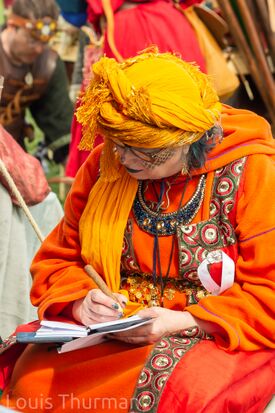The Brass Coast leadership
Overview
The Freeborn are traditionally cautious when it comes to the idea of authority and control. They value loyalty and even discipline, but they are an informal people who have little regard for titles and status and even less for those who think such positions make them more important than their fellows.
The Brass Coast is a loose-weave community of towns and villages, each of which is effectively governed by the wealthiest, most influential family that dwells there. This can lead to fluid but infrequent shifts of power as familial fortunes wax and wane. The settlements are tied together by the trade wagons belonging, constantly on the move, transporting goods, news, and people with equal facility. When more formal agreements between families or settlements are needed, the dhomiro of each family involved will negotiate a formal contract.
Freeborn society is not so much controlled as ‘nudged in a beneficial direction’ by the families with the most power and influence. There is little leadership beyond the dhomiro. There is a presumption of cooperation between different families that are part of the same tribe, but this presumption only makes the inevitable rivalries more fierce. When this rivalry threatens to get out of hand, it often falls to the hakima – the magical custodians of the Freeborn tribal legacy – to step in and try to mediate some sort of peaceful conclusion. While the hakima have no formal authority over the dhomiro, their advice and magical support can help turn a strong family into a truly great family. The hakima stand outside the traditional Freeborn family structure, placing the nation above all other loyalties; their official role is to help ensure Freeborn prosperity and security. This neutrality makes them an essential part of the political structure and most are highly respected.
To outsiders, it is a chaotic and unstructured form of governance, but to the Freeborn it is as natural as breathing. When an outsider finds themselves frustrated trying to work out who is in charge, the traditional Freeborn response is “the wind”. A less metaphorical response might be to ask “why does someone always have to be in charge?” When a decision needs making that affects a number of families, the hakima and the families gather to ‘discuss’ the issue. To outsiders this is a wild affair of drink and revelry, but the informal atmosphere of the gathering in no way undermines the severity of the discussions. The exchange of coin, scripts of trade and goods eventually leads to a common opinion and subsequent decision, usually formalised through a contract.
Dhomiro
By tradition, each Freeborn family is represented by a dhomiro. Their role is to represent their family's interests to those who seek to deal with the family as a whole. Choosing a dhomiro is not a political decision, most families simply select the most suitable individual. They are usually chosen on account of their ability to organise or communicate, and they have great influence but little formal power. Any dhomiro that put on airs or graces would be ridiculed and dhomiro that are not effective in furthering their family's interests are quickly replaced.
Leading a territory
Despite this, Imperial rule requires that the Freeborn select senators. The Freeborn solution is simple; wealth and influence dictate many things in Freeborn life and they see no reason why senatorial seats should be any different. As a result, when a senatorial seat becomes vacant, the Brass Coast hold an open auction at which any dhomiro can participate. Whoever presents the highest purse wins the right to appoint the senator. Only someone who is recognized as a dhomiro may bid in the auction. Dhomiro is not an Imperial title so there is no concept of a legal proxy being appointed, but this does not often become an issue - it is rarely the business of another family how a dhomiro is chosen, or how they serve their people. The winning family may choose any Freeborn citizen to take the title, including a dhomiro or a hakima.
Those who are not successful in claiming a seat reclaim their purse. The money paid by the winner is given into the care of the egregore, who is charged to use that money for the good of the nation. If the purse is significant in value, then the egregore will go to the hakima for advice on how to distribute the money. Though they are not bound to follow this advice (and is quite rare for all the hakima to agree on anything) - it is often the best way to identify where the money might do the most good.
If a senator is later revoked, the dhomiro does not receive any automatic recompense. Although it should be borne in mind that the egregore has control of the purse, and might choose to offer the dhomiro who appointed a revoked senator some measure of reimbursement, depending on the advice of the hakima.
While outsiders may be offended by the way in which the Freeborn auction their senatorial titles, it is a matter of pride that there is comparatively little duplicity in the political achievement of the Freeborn senators. To the Freeborn way of thinking their approach is honest - while the politics of other nations can be devious and underhanded, the Freeborn are forthright and open in the methods employed.
The senators for each Imperial territory are re-elected at specific equinox and solstices during the year. The Senator for Segura is elected at the Spring Squinox, the Senator for Feroz is elected at the Summer Solstice, the Senator for Kahraman is elected at the Autumn Equinox, and the Senator for Madruga is elected at the Winter Solstice. In the event that more than one Senate seat is empty at a time, auctions are run consecutively starting with the seat that should be elected in the current summit and moving on chronologically.
You can read much more detail about the ideas and the approach used for the unique Freeborn approach to their senators here.
Incumbent
The current Freeborn senators are listed below - see the individual territory pages for a full election history for each position.
- Feroz - Garviel i Abrira i Erigo
- Madruga - Eulàlia i Phovas i Riqueza
- Kahraman - Ramos I Inigo I Raqueza
- Segura - Velasco i Guerra
Further Reading
Core Brief
Additional Information

